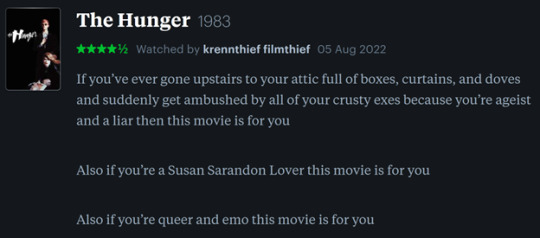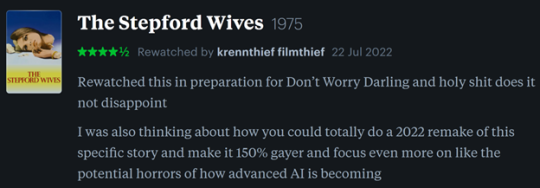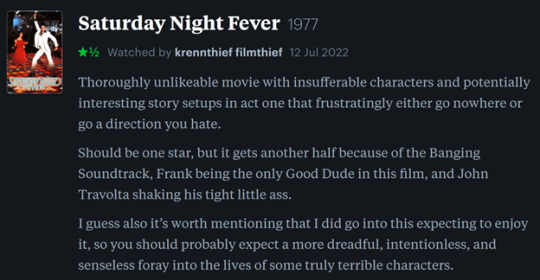Text
An Ode to 'Everything Everywhere All at Once' by David Gate
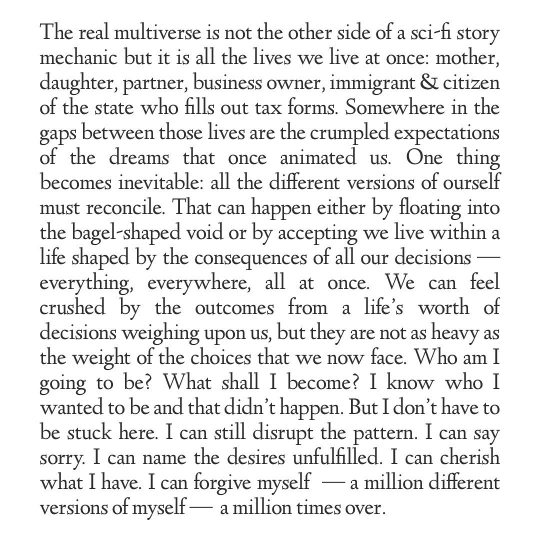
17K notes
·
View notes
Text
Free horror films on Youtube: 2021 edition
Around five years ago I made a list of free horror movies you could watch on Youtube. Unfortunately none of the links work anymore and it’s much harder to get full-length films on Youtube these days.
But not impossible! Here is a brand new version with links that work as of 9/21/21 for all your Halloween marathon needs. Some of these are very old movies in public domain, others are just up on Youtube and nobody cares enough to take them down. A few are on Youtube Movies and are free with ads embedded (*). Enjoy!
The Old-School Classics
Nosferatu (original 1922 version)
The Cabinet of Dr. Caligari
Faust
The Mummy
Bride of Frankenstein
Phantom of the Opera
Night of the Living Dead
The Innocents
The Brain That Wouldn’t Die
The Blob
70s-80s-90s
The Omen
Black Christmas
Halloween
The Stepford Wives
The Stepfather
Ginger Snaps
Brahm Stoker’s Dracula
Dog Soldiers
Frailty
Horror Around the World
Diabolique
Black Sunday
M
Nosferatu the Vampyre (Werner Herzog 1979 version)
Hour of the Wolf
Black Sabbath
Suspiria
Vampyr
Haxan : Witchcraft Through the Ages
Rated V for Vincent Price
The House on Haunted Hill
The Last Man on Earth
The Pit and the Pendulum
The Masque of the Red Death
Stephen King made for TV corner:
Sometimes They Come Back
The Stand
The Tommyknockers
The Langoliers
Storm of the Century
Hammer Films British Horror
The Vampire Lovers
Twins of Evil
Captain Kronos Vampire Hunter
The Evil of Frankenstein
More Older Horror Films That are A little Lesser Known but I Love Them
A Bucket of Blood
Dementia 13
Carnival of Souls
The Lodger
Lemora: a Child’s Tale of the Supernatural
Some Recent Indie Horror Films You Really Should Really Try
Darling
Coherence
Oculus
Lake Mungo
Triangle
YouTube Films Currently Free with Ads that More or Less Fit the Bill
Trollhunters (*)
Gremlins (*)
The Silence of the Lambs (*)
Addams Family Values (*)
20K notes
·
View notes
Text
Everything Everywhere all at Once (2022)
(Watched Sep 17th, 2022)
When I review movies on here, I typically like to express my knee-jerk reaction, re-read my own review, edit it a thousand times, and then completely forget about my original thoughts months later. However, when a movie like this comes along, I have to step back for a bit to gather my thoughts and formally write something that encompasses the full spectrum of my feelings. Maybe watch the film a few more times to solidify my thoughts and feelings. Perhaps it was a mistake to watch this movie as many times as I did, because it dominates my every thought. Perhaps I should watch it again and again and again.
My complete and utter adoration for this movie has resulted in me writing my longest film review ever. One that has inspired me to reincarnate my old movie review blog from my high school years. One that essentially boils down to this rambling, insufferable, self-indulgent essay. I will bloviate in my probably unnecessary recaps of the textual content of the film and over-analyze every aspect that I find profound or worth discussing (and there is a lot). I will probably reach inaccurate conclusions and be very redundant, and I will only have hyperbolic words of praise for it. If you choose to read this long-winded, obnoxious (nearly 2,500-word!) essay on my favorite movie, I hope that you understand that I wrote it for me as much as I wrote it for you.
To start, I must express that my absolute favorite kind of media always involves imaginative, interesting high-concept ideas as a backdrop to a thorough examination of characters, focusing heavily on their emotions and evolving philosophies. Needless to say, Everything Everywhere All At Once is all of that and more. A film that can go so far and so deep in every direction is more than deserving of the very title it boasts, and I have made it a point to tell anyone who may care that this is my new favorite film.
It is wholly appropriate that this film approaches a concept as maddening as multiverse theory by incorporating such a delightful aesthetic of eclecticism and chaos (an aesthetic I’ve become more familiar with having viewed more Daniels projects). Despite this aesthetic, however, it manages to utilize its overwhelming absurdity as a vessel in order to deliver a compelling argument that ruthlessly rejects the seemingly inevitable, creeping sensation of nihilism that may come when contemplating the endless chaos of existence. I find that this rejection goes further than many other films with similar philosophies, providing viewers with a solution to the impending despair: to accept that this is the nature of things and to share compassion and kindness with others in order to make the world better for everyone. It seems so small, so simple to say it like this, but the context of this film brings this idea forward so successfully that you cannot help but realize just how radical and powerful this idea truly is in the face of everything, everywhere, all at once.
The film’s recurring motif of circles—how everything connects with perpetuity, and the different ways in which each character’s relationship with this motif and its different iterations, meanings, and contexts—is brilliantly incorporated into the ideas that are being openly discussed. The human experience as we know it is rife with supposed and real perpetuity: laundry, taxes, marriage, love—everything. Like our clothes in the wash, we go in circles, again and again, repeating mistakes, revisiting what-ifs, kicking ourselves over the should-haves or the could-haves. You become so overwhelmed at the futility of trying in the face of the chaos that hope begins to seem impossible. The abject horror of this realization has the capability to absolutely destroy someone, to kick-start them down a careless path of destruction with innumerous collateral damage in their wake. Hence Jobu Tobacky, and hence her absurd creation of the Everything Bagel, our most menacing iteration of the circle motif.
Evelyn herself is struggling with a seemingly perpetual chaos, symbolized by evocatively messy non-literal circular concepts such as laundry, taxes, and most prominently, generational trauma, all culminating in her exhausted fight to maintain control. One can even read Evelyn’s initial outlook as that of a selfish survivalist, taking what she can and chiding impracticality in others (while hypocritically chasing less practical pursuits along the way). We learn that she had so many missed opportunities, that her life is chock full of what feels like never-ending failure and frustration. She is, as informed by Alpha Waymond, the worst version of herself across the multiverses, but we also learn that this is not a particularly bad thing—our Evelyn has the highest capability to connect to the various multiverses because of her plethora of missed opportunities. And there is some truth in that in reality, as well—if you are familiar with failure, you are better equipped to handle it and manage it. I’ll circle back to a short discussion of generational trauma, as well.
If the bagel as a motif reflects the burned hollowness of Jobu Tobacky’s outlook, then Waymond’s motif of google eyes reflects the inverse, invoking the joy of arbitrary silliness, effectively embracing the beauty of chaos, while also functioning as the symbol that represents Evelyn’s ultimate revelation—kindness and love is the antidote to the poison of nihilism. She literally transforms an object of violence (a bullet) into the object representing this kindness and love (the google eye), and in a perfect physical action that parallels the crux of her character arc, places an eye on her forehead. This revelation invokes the visual pun of “opening your third eye.” Instead of approaching the horde with violence in the vein of Jobu Tobacky, she instead uses empathy and compassion a la Waymond, assessing each of her opponents’ problems with her newfound ability to glimpse the totality of all of their existences, finding what they need, giving it to them, and nonlethally subduing them. The through-line with each of these encounters is human connection and compassion, which is also the basis for Evelyn’s approach to her final fight with Jobu (and her impassioned declaration of acceptance with Joy in the parking lot). These ultimate confrontations mesh the film’s lofty philosophical theme of rejecting of nihilism with its more immediate and relatable theme of breaking the cycle of generational trauma.
How this film deals with and overcomes generational trauma is truly something spectacular, and the ways in which it manifests and is confronted both emotionally devastated me and provided me catharsis. When Gong Gong all but explicitly disowns Evelyn through his continually outward expressions of disappointment of her based on his own failure to temper his expectations of her, it comes to no surprise that Evelyn perpetuates this cycle of targeted disappointment in Joy. Evelyn veiling her own inability to connect with and understand her daughter by throwing Gong Gong under the bus for being old and out of touch has an effect opposite to her intention to convey an admittedly weak sense of ally-ship. In her failure to openly advocate her own daughter’s queerness, she accidentally demonstrates her ignorance, willful or not, which is just one of the thousand cuts Joy must endure in a prison of unintentional repression, one that I am sure many fellow LGBTQ+ people are familiar with.
Through the film’s exposition concerning her origin, it is all very clear that Jobu Tobacky has felt and will always feel every single emotional, physical, and mental experience that every Joy feels, which must consequently mean that our Evelyn is at least partially to blame for her philosophy if not a whole swath of her multiversal counterparts (particularly Alpha Evelyn). Though Jobu Tobacky’s consciousness contains an unfathomable number of experiences, our Evelyn’s revelation and unyielding drive to protect and accept any iteration of her daughter is enough to reach through to Jobu. The macrocosm of the multiverse being saved directly mirrors the microcosm of Evelyn refusing to perpetuate the cycle of generational trauma, perhaps even shifting Gong Gong’s rigid understanding of the world and his family through her demonstration of unconditional love for her daughter.
The film’s emphasis on demonstrating that Waymond’s ideology—to treat everyone with kindness, especially if we all don’t know what’s going on—is the most powerful force because it bridges compassionate connections rather than allowing chaos and violence to separate us. Waymond himself proves to be much stronger than everybody gave him credit for in the beginning, his vulnerability to his feelings and emotions functioning as almost a desperate invitation to Evelyn to reconsider her own rigid understanding of the world. In every universe, Waymond surprises Evelyn with some variation of his resilience, from his decision to file for divorce, to him urging everyone to stop fighting despite having been stabbed by his own wife. Waymond’s resilience shines the most for me when he delivers the most romantic line in all of film history: “So, even though you have broken my heart yet again, I wanted to say, in another life, I would have really liked just doing laundry and taxes with you.”
I would like to mention here that the emotional buildup to this line was unbelievably skillful—the yearning, the melancholy, Waymond’s situationally subversive earnestness. The real killer here was the directors’ choice to visually and tonally emulate the smoldering imagery of In the Mood for Love, a film I have only recently seen for the first time. But as soon as Waymond uttered this line the first time, I immediately burst into uncontrollable tears in the theater. The second time I was already crying anticipating this moment. Absolutely stunning cinema. Peak romance. Waymond is everything I aspire to be in a person—kind, sweet, goofy, compassionate, and thoughtful.
As the primary vessels of a story, the performers here are some of the greatest of all time. The impeccable Michelle Yeoh demonstrating to us all just how much raw talent courses through her veins, the phenomenal Ke Huy Quan—a staple of my childhood due to his performance as Data in The Goonies—showcasing his own acting chops and inhabiting so many variations of one character, and, completing this perfect triad of performers is Stephanie Hsu, whom I knew only as Christine Canigula from the original cast recording for the off-Broadway musical Be More Chill, becoming the most batshit chaotic character I’ve ever had the pleasure of seeing in a movie. My beloved Jamie Lee Curtis, coolest babysitter aunt actress ever, giving layers to the initially flat-seeming and hilariously named Deirdre Beaubeirdre and gets to be all things—an absurd, bureaucratically cruel but deep-down soft and even lovable freak. James Hong even gets more to do with his character than just be the ashamed father who expected more of his daughter—he's funny, commanding, dumbfounded, and snide.
With the impact the story and characters have left on me out of the way, I’d like to very disjointedly gush about the actual production elements of this movie in the least academic ways I can manage, so please bear with me as I describe things I used to understand better in film school but clearly have escaped me years later:
This film looks stunning, its blocking and directing so beautifully planned and captured, its frame compositions and camera movements honed to perfection—I will never get bored of any visual moment of this movie in rewatches. Lighting, use of color (especially whenever Jobu Tobacky is involved!!!) are brilliant. The use of practical effects and old-school camera tricks for a lot of the film was unbelievable—they really squeezed every bit of worth out of the budget, because you would think that it cost way more to produce something of this overall caliber.
Sounds, noises, and music all worked so perfectly. The soundtrack by Son Lux is sublime, and upon relistening divorced from the film, you really get to appreciate their genius use of leitmotifs, each written and implemented in the most emotionally effective ways. The disgusting hot dog finger squelching was funny every time, even when the tender romance between hot dog finger Evelyn and Deirdre played out in earnest. In this film’s music and sound, there’s whimsy, an overwhelming sense of the grandiose, somber, quiet moments, tense and thrilling soundscapes.
For their second feature film ever, Daniels have managed to wrangle the most talented people, cast, crew, everyone. I finally got around to watching Swiss Army Man because of this film, and I believe that my viewing of that movie was enhanced because of my love for Everything Everywhere All At Once. These two get me, with their outwardly absurd and juvenile humor simultaneously interacting with and informing truly profound stories. In a few tweets, I learned that Daniel Kwan used to be ashamed of his tendency to make maximalist films, ashamed of the way his ADHD brain made him think and create, but he has learned to accept and even appreciate him and his creative partner’s maximalist approach. Evelyn being described as living with undiagnosed ADHD adds so much more depth to an already incredibly fleshed-out character, and in turn this revelation makes her even more relatable to some, myself included. It could not be more appropriate that Daniels have been operating on ADHD brain for all of their projects, especially this one.
Everything Everywhere All At Once has rightfully become one of my all-time favorite films. It’s beautiful, hilarious, painful, wondrous, absurd—it really is everything. In recent years, there has been an increasing critical distinction between art and entertainment, and while I will never write off giant spectacle, cash-grab entertainment as “not art” (even if it’s cynical and corporate, it is still art), it’s films like this that remind me what’s so important about cinema as art. Good art makes you rethink your preconceived notions. It makes you question why our culture and society are the way they are. It makes you see what life is like for people you may not realize are very much like you, and makes you consider the possibility and potential of engaging with the world. More films should do this. Daniels have set the bar for optimistic, maximalist, and humanist cinema, and I can only hope that we see more filmmakers continue this trend and push the envelope to even greater lengths, maybe even as far as beyond the multiverse.
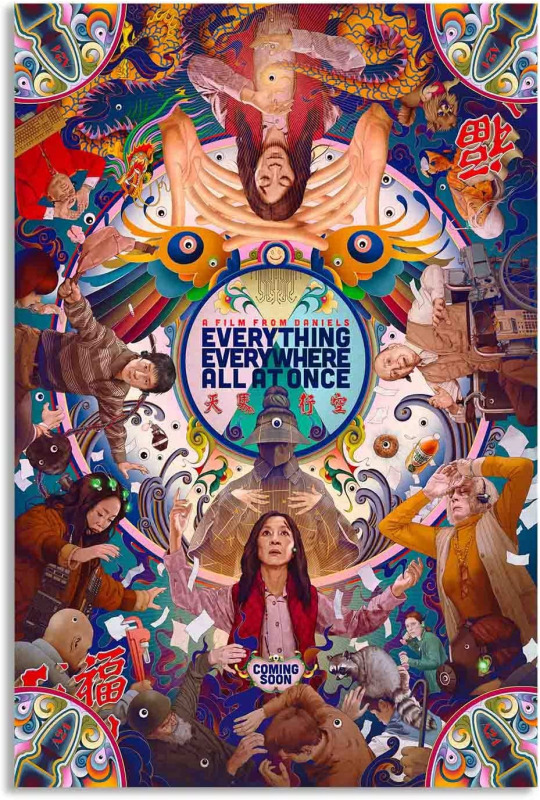
#Everything Everywhere all at Once#2022#Told you I'd write a full ass essay#Took a bit longer to get around to watching this for the third time#But now I can finally post this#Yeah I had it written and ready to go for a while
0 notes
Photo

2 notes
·
View notes
Text
Nope (2022)
(Watched on Aug 7, 2022)
PHENOMENAL cosmic horror that says So Much about how the film industry (and to a broader extent, media in general) effectively forces artists to sacrifice their principles, bodies, and safety for the entertainment of a brutally uncompassionate, ravenous general audience that only knows to consume
Real and phenomenal performances from a star-studded cast—Keke Palmer and David Kaluuya inhabit my favorite aspects of a genuine, authentic sibling relationship. Steven Yuen skyrockets a role I expected to simply be a sleazy business owner guy into one of the most interesting and tragic narrative foils I’ve seen in a very long time. Also Angel is my Boy I love him so much. For real though, Keke Palmer was born to be a star.
There is So Much going on in this movie that just thinking about anything for too long gets me so hyped. That Monster design. The Gordy Subplot. The Bad Miracles motif. The Evangelion and Akira references. OJ’s impressive skill handling animals versus his extreme lack of human social skills. OJ and Jup both holding onto Literal trinkets connected to their horrific traumas. The role that eye contact plays in the story and how it relates to cameras capturing subjects (AKA the creature capturing its victims)
On top of that, this film looks and sounds Gorgeous. It’s funny, truly scary, the characters and writing are compelling and worth caring about, and it’s smart as hell. Props to each and every member of the cast and crew. I cannot wait to watch this again and again
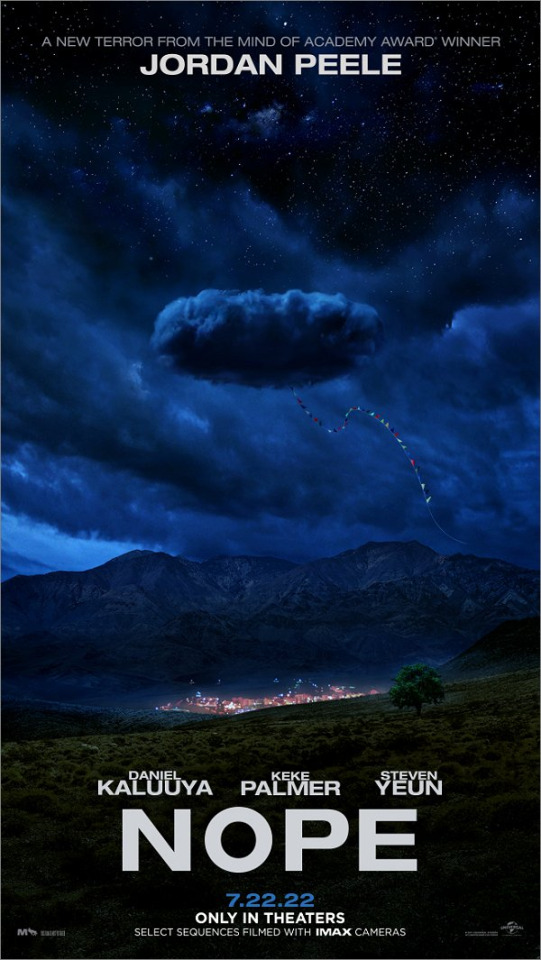
11 notes
·
View notes
Text
Stoker (2013)
So I was on a bit of a Shirley Jackson kick last month and I devoured the Haunting of Hill House novel and loved it so much I immediately read We Have Always Lived in the Castle and learned that this film had some similar vibes to Castle. It was already on my must watch list anyway, so I figured it’d be worth watching the 2018(?) We Have Always Lived in the Castle and found it to be such a boring and by the numbers adaptation that I was Beyond excited to watch Stoker and it Did Not Disappoint
Though there are similarities in vibes and story setup between We Have Always Lived in the Castle and Stoker, this film certainly does its own thing and more. It’s literally a cinematic masterpiece, every single shot, camera movement, lighting change, frame composition, and visual motif is painstakingly accounted for to deliver an extremely striking and exceptional piece of visual storytelling.
All in all, this movie fucks. Sometimes the circumstances of it fucking are questionable and will make you deeply uncomfortable at times, it fucks so hard and it Rules.

3 notes
·
View notes





